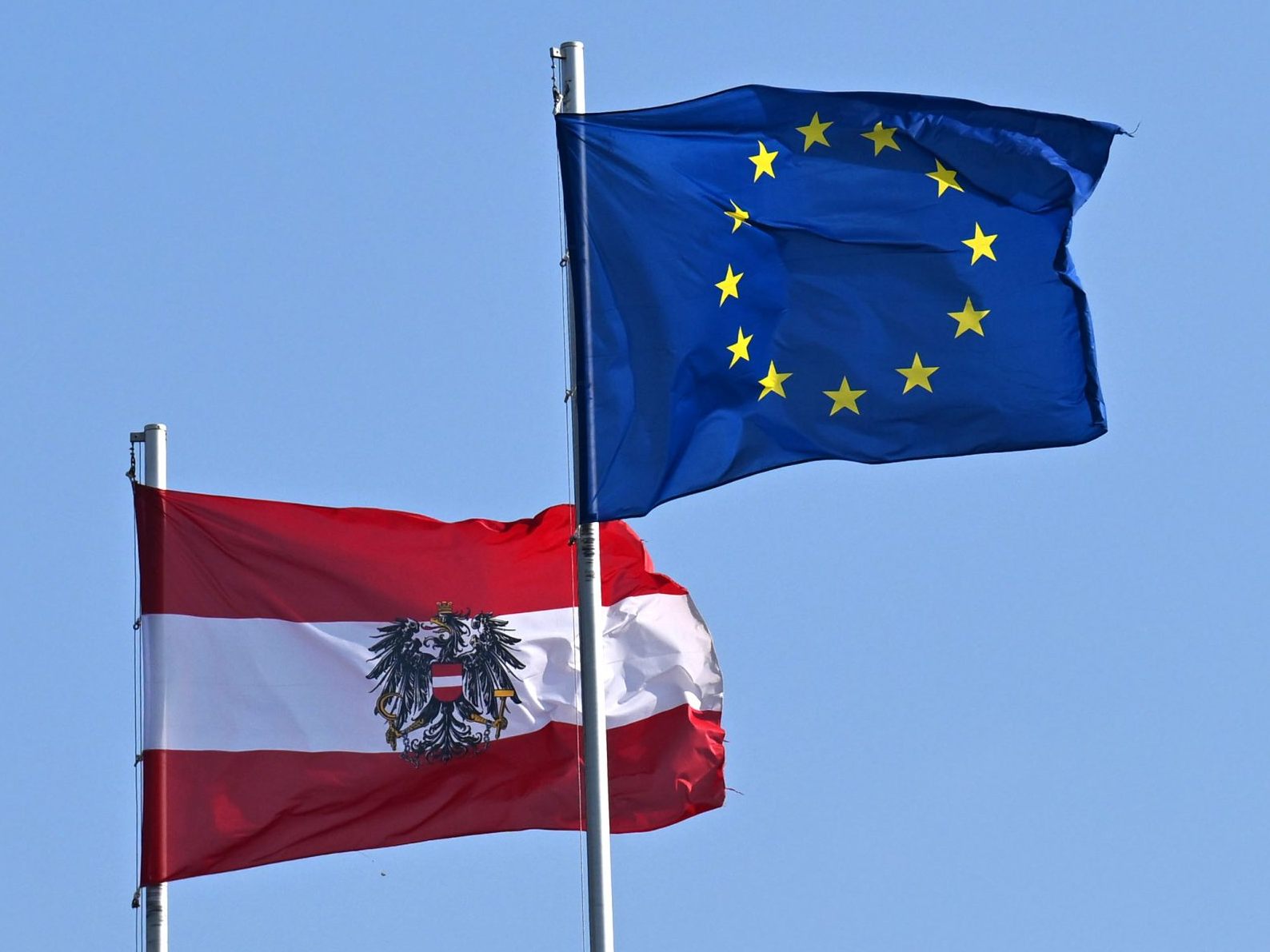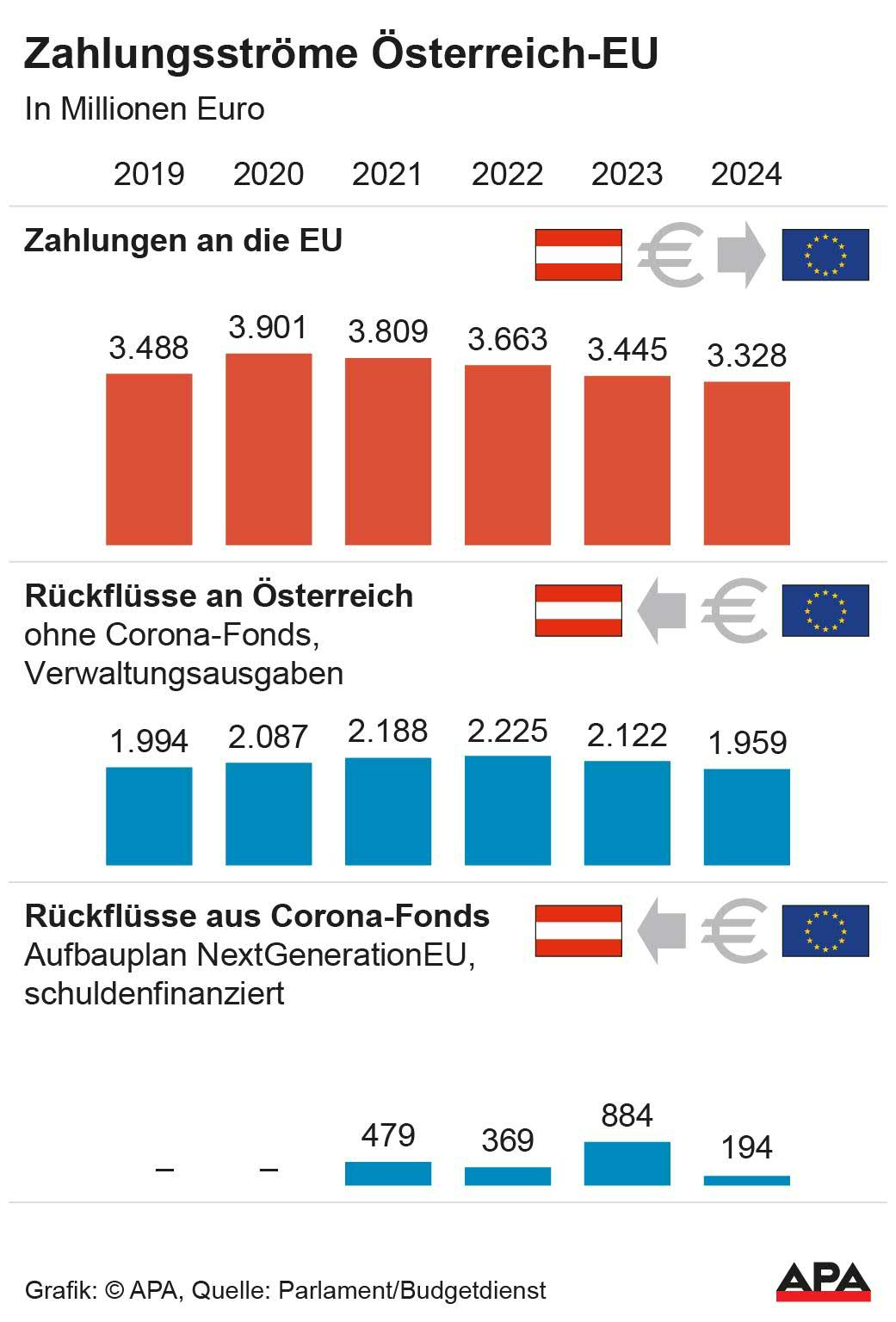4.4 Billion for Brussels: Austria's EU Contribution Continues to Rise

The Austrian gross contribution to the European Union amounted to 3.328 billion euros in 2024. According to figures from the Parliament's Budget Service, it is expected to rise to an estimated 3.5 billion euros this year and to 4.401 billion euros in 2026. This is according to a response to a parliamentary inquiry by the FPÖ published on Friday.
Higher returns expected in 2025 and 2026
The Austrian gross contribution to Brussels was offset by returns to Austria amounting to 1.959 billion euros in 2024, as further indicated in the response. Higher returns to the federal budget are also expected for 2025 and 2026, namely 3.914 billion and 2.103 billion euros, respectively. These figures do not include all returns, as not all EU programs are processed through the federal budget, but are partly paid directly by the EU Commission. Since Austria contributes more to the EU budget due to its high economic performance than it receives in returns, it has been a net contributor to the Union since joining the EU.

The largest portion of EU funds in Austria, as in previous years, goes to agriculture. The European Agricultural Guarantee Fund (EAGF), which is crucial for agricultural direct payments, accounted for 701 million euros for Austrian farmers in 2024, and the Agricultural Fund for Rural Development (EAFRD) accounted for 518 million euros. In addition to agriculture, Austria particularly benefits from returns from the EU research framework program "Horizon Europe": Last year, 312 million euros flowed from Brussels to domestic research funding.
Not included in the returns are the EU funds that Austria has been receiving since 2021 from the Corona Recovery Fund "NextGenerationEU" (NGEU). These funds are jointly debt-financed by the EU and must be repaid from 2028. Also excluded are EU administrative expenses. From NGEU, Austria received 479 million euros in 2021, 369 million euros in 2022, 884 million euros in 2023, and 194 million euros in 2024.
Repayment for Recovery Fund debts costs Austria 640 million euros per year
The repayments for the approximately 800 billion euro recovery fund must be completed by 2058, and they are a sensitive point in the upcoming negotiations for the next EU financial framework from 2028 to 2034. According to the proposal by the EU Commission, about 24 billion euros per year should flow from the EU budget for debt repayment and interest service. Austria's share, based on its current share according to its economic performance (Gross National Income/GNI) of 2.66 percent, would amount to about 640 million euros per year, as indicated in the response to the inquiry. This is likely to further increase Austria's gross contribution in the upcoming financing period.
According to the budget service, between 2021 and 2024, nine EU member states, including Austria, were on average net contributors, while in the remaining 18 EU member states, the returns from the EU budget were higher than the respective national EU contributions. In relation to the GNI, Germany, France, and the Netherlands had the highest net contributor positions. According to the budget service, Austria ranked seventh in the lower middle field of EU net contributor nations. The exit of the United Kingdom from the EU has led to the deterioration of the net position of numerous EU states. However, Austria's average net position improved slightly from 2021 to 2024 compared to the previous financial period, from -0.31 percent of the GNI to -0.26 percent of the GNI. This is mainly due to Austria's rebates on the EU contribution, it is said.
FPÖ Rages Over "EU Debt Tsunami"
The Freedom Party, which had submitted the inquiry to the budget service, is demanding an immediate renegotiation of Austria's EU contributions and a veto against any further debt union at the EU level. They criticized that "billions in tax money are flowing unchecked to Brussels" without any significant return. FPÖ budget spokesman Arnold Schiefer and FPÖ finance spokesman Hubert Fuchs described the returns in a statement as a "bad joke. Apart from agriculture, which is already suffering under EU bureaucracy, almost nothing reaches the ordinary citizen and our SMEs."
Particularly "perfidious" is the construct of the debt-financed EU recovery plan "NextGenerationEU," said Fuchs. "In Brussels, they celebrate a few alms from the EU pot, but they burden our children and grandchildren with a huge mountain of debt. We receive 1.1 percent of the grants, but are supposed to repay 2.7 percent of the debt. This is not a 'recovery plan,' this is an EU debt tsunami rolling towards us, and the government is watching idly."
(APA/Red)
This article has been automatically translated, read the original article here.





